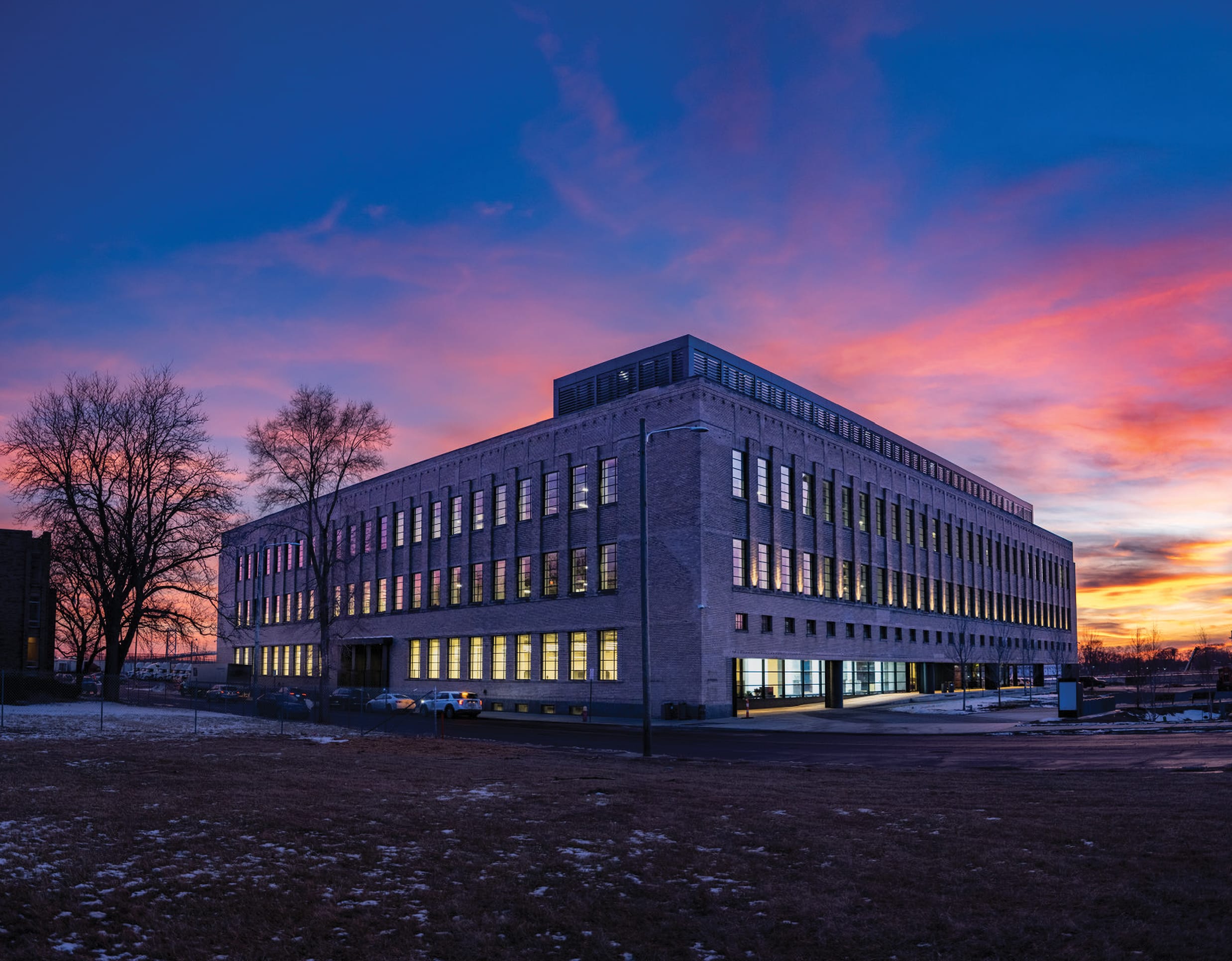While we may not use the term “firing on all cylinders” literally when describing a future so focused on electric vehicles (EVs), it’s still applicable to Michigan as the state continues to boldly drive the automotive and mobility industry forward. With a nod toward LIFT — the advanced manufacturing institute focused on mobility that is operated by the American Lightweight Materials Manufacturing Innovation Institute (ALMMII) located in Detroit’s historic Corktown neighborhood — perhaps the new metaphor should be that the state continues to reach new heights. After all, as of March 2023, Michigan has welcomed more investment project dollars than any other state, with over $16.6 billion since 2015.
Michigan has a decided head start. Among the state’s attributes, Michigan is No. 1 in the nation for mobility-related patents. And with 96 of the top 100 automotive suppliers to North America having a presence in Michigan, 60 of them are headquartered in the state.
Will the restoration of workers’ rights that was recently signed into law drive them away? Not likely. OEMs and suppliers based around the world have been working with the United Auto Workers and the AFL-CIO for generations. Within a few days of Gov. Gretchen Whitmer signing the “Restoring Workers’ Rights” package into action, more investments continued to arrive. Companies are attracted to Michigan due to the opportunities, connectivity and attention businesses receive.
“Michigan workers are the most talented and hard-working in the world and deserve to be treated with dignity and respect. These bills will protect health and safety, ensuring healthcare workers can put patient care ahead of profit, construction workers can speak up when there’s a safety issue, and employees can call attention to food safety threats and other problems. Let’s continue delivering for working people and ensuring Michigan is open for business,” said Gov. Whitmer.
After the “Restoring Worker’s Rights” bill was passed, Semiconductor maker AyDeeKay (dba indie Semiconductor) made an investment of $12.5 million with plans to create 180 jobs in Auburn Hills. The company specializes in making edge sensors for Advanced Driver Assistance Systems and products for connected car, user experience and electrification applications. Through the Michigan Strategic Fund, the Michigan Economic Development Corporation (MEDC) is supporting the project with a $10 million performance-based grant.
On the same day, Auburn Hills-based BorgWarner announced a $20.6 million, 186-job expansion driven by the EV business, with multiple investments including: $5 million in Auburn Hills; $5 million in subsidiary Rhombus Energy Solutions to make EV chargers in Dearborn; an EV pack production expansion in Hazel Park by subsidiary Akasol; and a new 100,000-sq.-ft. EV battery module and pack service center. The family of projects is backed by a $1.86 million performance-based grant through MEDC’s Michigan Strategic Fund. Reports say BorgWarner expects its electrification business to generate $4 billion in revenue by 2025.
The forecast instead is growing brighter as connected, autonomous, shared and electric (CASE) mobility solutions morph into more avenues for innovation – what Mike Ramsey, vice president of Gartner, a technological research and consulting firm, nicknamed, “COSE: Chips, Online, Software, Expensive.”
 The way he and the Gartner analysis machine see it, the profound and widespread chips shortage in recent years means we’re only a few years from seeing half the top 10 OEMs take matters into their own hands and make semiconductors themselves, backing the proliferation of more than 700 million connected vehicles globally.
The way he and the Gartner analysis machine see it, the profound and widespread chips shortage in recent years means we’re only a few years from seeing half the top 10 OEMs take matters into their own hands and make semiconductors themselves, backing the proliferation of more than 700 million connected vehicles globally.
“Gartner is forecasting the value of semiconductor content in cars will nearly double over the next eight years to about $120 billion, with the fastest growth in electric vehicle components, and safety and autonomy features,” Ramsey shared in summer 2022.
With ample water and power assets and a talent concentration of mechanical and industrial engineers that is the highest in the nation at over four times the national average, it would appear the CASE for Michigan’s future mobility solutions is rock solid.
Billions & Billions
Global OEMs see how Michigan is moving the future of mobility forward, and they’re setting the pace for widespread industry growth. In 2022, Michigan attracted more than $14 billion in EV and battery investments alone. Two of the state’s key automakers, General Motors and Ford Motor Company, are at the helm of this wave of innovation and expansion.
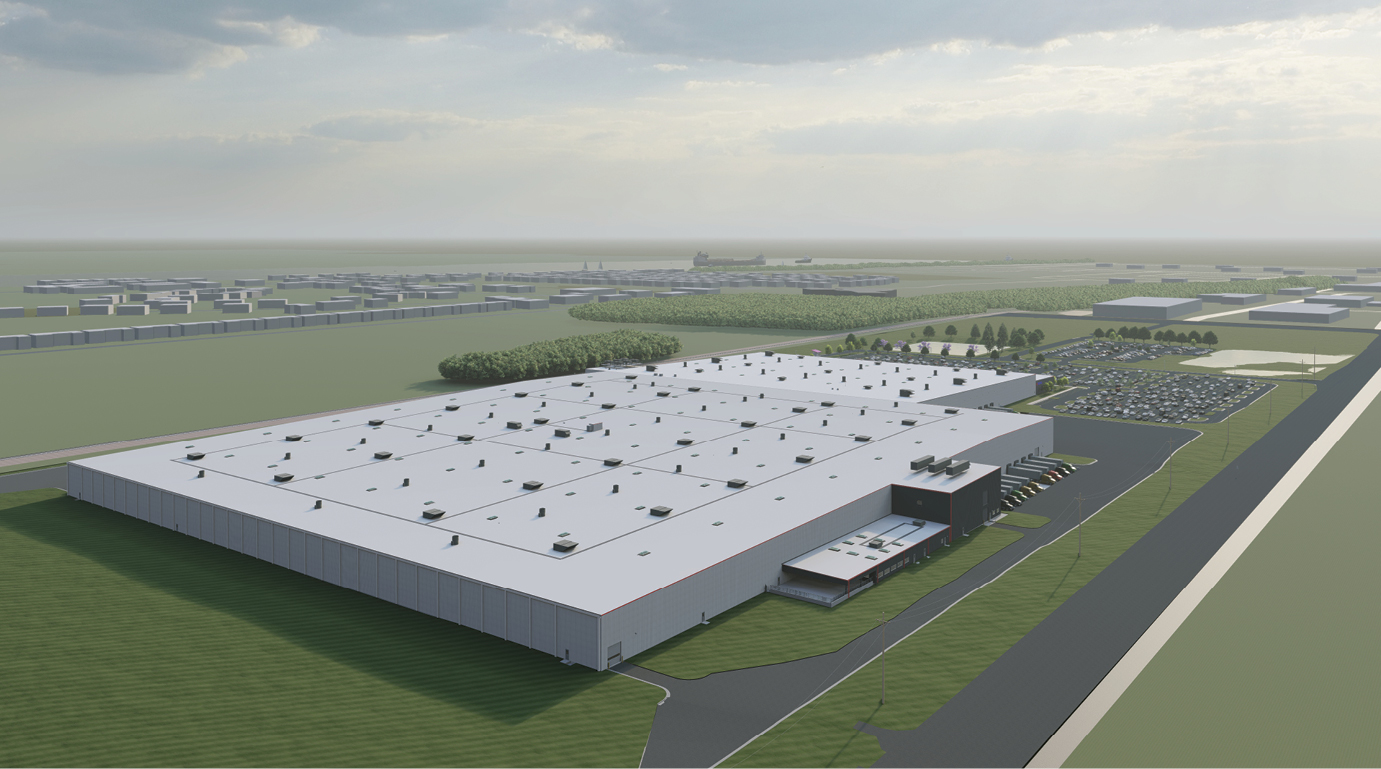
Magna is investing more than $500 million to expand in three Southeast Michigan locations: Shelby Township (powertrain), Detroit (seating) and St. Clair (battery enclosures). Magna has 32 facilities and more than 10,000 employees in the state.
Rendering courtesy of Magna
General Motors has already announced numerous plans, total $7.1 billion, to strengthen Michigan’s EV future. These projects include a $4 billion investment at its Orion Township Assembly Plant, a $2.6 billion investment in an Ultium high-volume battery cell manufacturing facility in Lansing (in partnership with LG Energy Solution), and a $510 million investment in its Lansing Grand River plant. On top of that, the company continues to invest in internal combustion, too: In January, GM announced $579 million to prepare its Flint plant for a sixth-generation engine and $216 million to upgrade its Bay City plant.
Ford is also rapidly expanding and investing in the state, with more than $5.6 billion in investments. The first wave was announced in June 2022, when the company committed to invest $2 billion and create more than 3,200 “good-paying, UAW jobs” across its Michigan plant portfolio in Dearborn, Wayne and Flat Rock to boost both its EV and gas-powered vehicle operations, plus a new packaging operation in Monroe Charter Township.
“We’re not a technology incubator. We’re technology accelerators.”
— Joe Steele, Senior Director of Communications and Legislative Affairs at LIFT, the U.S. Dept. of Defense Manufacturing Innovation Institute focused on materials science, manufacturing processes, systems engineering and talent development located in Detroit, at a June 2022 DOD demonstration
“Today’s generational investment by an iconic American company will uplift local families, small businesses, and the entire community and help our state continue leading the future of mobility and electrification,” said Gov. Whitmer. “Let’s continue bringing the supply chain of electric vehicles, chips, and batteries home while creating thousands of good-paying jobs and revitalizing every region of our state. Since I took office, we’ve secured over 30,000 auto jobs and landed multiple electric vehicle and chip-making factories. We’re on the move, so let’s keep our foot on the accelerator.”
The count keeps climbing: In February 2023, Ford pledged to invest and create jobs at its new Ford BlueOval Battery Park in Marshall on one of a fleet of truly investment-ready sites that the MEDC has been building out in such areas as Lansing, Southeast Michigan, Ann Arbor, Flint, Shiawassee County and Jackson.
BlueOval Battery Park Michigan brings the total to more than 30,000 new automotive jobs since Gov. Whitmer’s inauguration in January 2019. The project will support Ford’s goal of producing two million EVs annually by 2026. Since 2016, Ford has announced nearly $13.5 billion in investments in Michigan, largely around electric and autonomous vehicle manufacturing, supporting nearly 12,500 new and retained jobs. The plant will make lithium iron phosphate (LFP) batteries. Ford is the first automaker to commit to build both nickel cobalt manganese (NCM) and LFP batteries in the U.S.
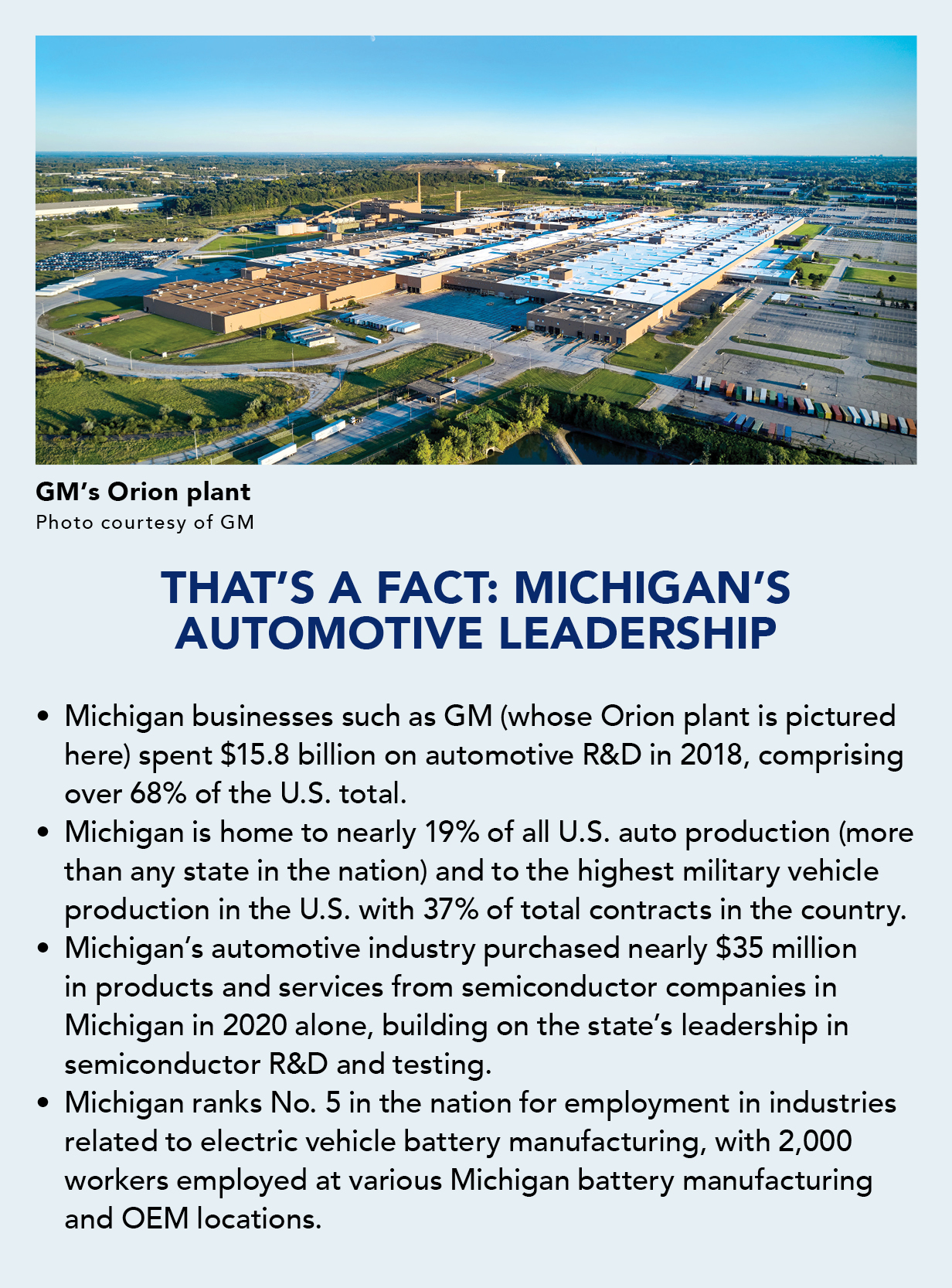
“Ford’s decision underscores the strength of our state’s automotive sector and the bipartisan, Team Michigan commitment to winning the future of mobility and battery manufacturing here in Michigan,” said Quentin L. Messer, Jr., MEDC CEO and Michigan Strategic Fund President and Chair. The Michigan Strategic Fund is backing Ford’s Marshall project with a number of incentives worth more than $1 billion.
Ford is also investing $126 million in the Michigan Central Innovation District, a globally recognized hub for talent, mobility innovation, entrepreneurship, sustainability, small business opportunities and community engagement. Its robust automotive ecosystem has attracted valuable industry partners, including Newlab, a multi-disciplinary technology center. In February the company announced plans to move its Detroit headquarters to the historic Book Depository building in the Michigan Innovation District.
“As a born-and-raised Michigander who has called Detroit home for years, I’m incredibly proud to help bring Newlab to the city I love, and to catalyze the development of the Michigan Central mobility innovation ecosystem,” said Alisyn Malek, managing director, Newlab Detroit. “Detroit and Michigan Central had all the factors we were looking for in our first expansion: a shared ethos, physical assets to enable real-world experimentation, a geography that is poised for significant growth, and a local hard-tech product development talent base that is second to none globally.”
State legislators are aiding in Michigan automotive expansion as well: In March 2023, they approved a $210 million transfer of state funds to Ford for the Marshall plant, while also approving a $200 million grant to Our Next Energy Inc. to open a $1.6 billion, 2,100-job EV battery plant in Wayne County’s Van Buren Township and $175 million to support Gotion Inc.’s nearly $2.4 billion, 2,350-job battery component plant near Big Rapids.
A November 2022 report from Argonne National Laboratory says that Michigan is one of three states set to dominate the automotive industry and “will be able to manufacture between 97 and 136 gigawatt hours’ worth of EV batteries per year by 2030.”
Overflowing Clean Energy Alternatives
Bolstering the success of Michigan’s automotive industry are the clean energy infrastructure and developments assembled throughout the state. Supporting this transition are Michigan’s energy suppliers, who are constructing plans to produce a locally sourced pipeline of clean power for the automotive industry and everyday consumers.
Consumers Energy’s economic development rate, approved by the Michigan Public Service Commission, is doing its part to propel Michigan’s mobility sector forward. The rate is just one part of an overall program of EV support from Consumers Energy that includes a “solid infrastructure of convenient charging stations stretching across Michigan, investing in a reliable and carbon-neutral energy grid, and helping residents and businesses save energy and money while powering their commutes,” according to Brian D. Barthelmes, executive and public communications lead for the utility. “We’ve set a goal to power 1 million EVs on Michigan roads by 2030,” he said, backed by such programs as PowerMIDrive and PowerMIFleet. The utility is also working directly with more than 50 companies and institutions on making the EV transition, most recently announcing a new connection with legendary Michigan company Domino’s Pizza to provide rebates for chargers serving EV fleets at seven Domino’s locations.
DTE Energy’s Smart Change program, an initiative focused on optimizing EV charging, has partnered with General Motors, BMW, Ford and other automakers to reduce stress on the energy grid during periods of high demand. As Michigan’s largest producer of and investor in renewable energy, this program enables DTE to acquire valuable data to ensure the stability and efficiency of the energy grid.
In April 2023, DTE announced that Toyota Motor North America (TMNA) enrolled in the company’s voluntary renewable energy program, MIGreenPower. The company’s R&D Headquarters in Ann Arbor and six other facilities across Washtenaw County are now on a path to use 100% renewable energy by 2026.

“Powering the Community” was the name of a float featuring the Michigan Central Innovation District that was produced by The Parade Company and Ford Motor Company for the 2022 America’s Thanksgiving Parade in Detroit.
Photo courtesy of Ford
“Toyota joins a growing list of Michigan-based automotive manufacturers and suppliers who are enrolling in MIGreenPower to meet their sustainability goals. Currently, more than 70% of MIGreenPower business customers are involved in the automotive sector,” said Brian Calka, vice president, Renewable Sales and Project Development for DTE.
Furthering these efforts to supply statewide renewable energy sources, in October 2022, Michigan Electric Transmission Company, a subsidiary of ITC Holdings Corp., announced plans to construct, own and operate new transmission lines throughout the state. By the end of 2023, this project is expected to provide over $6 billion in economic benefits and create 4,100 jobs. The company’s $850 million investment into the project is set to improve grid reliability, reduce congestion in the system and work to lower Michigan’s carbon footprint.
Part of this project will consist of constructing 110 miles of new 345 kilovolt (kV) lines that stretch from northern Indiana to a new ITC substation located around 20 miles southwest of Lansing. There will also be additional 345kV lines extending west of Lansing to Gratiot County. Lastly, 75 miles of existing transmission lines from Jackson County to Wayne County are expected to receive an upgrade.
“Investments like this are critical as we transition towards a clean energy and electric vehicle future,” said Gov. Whitmer.
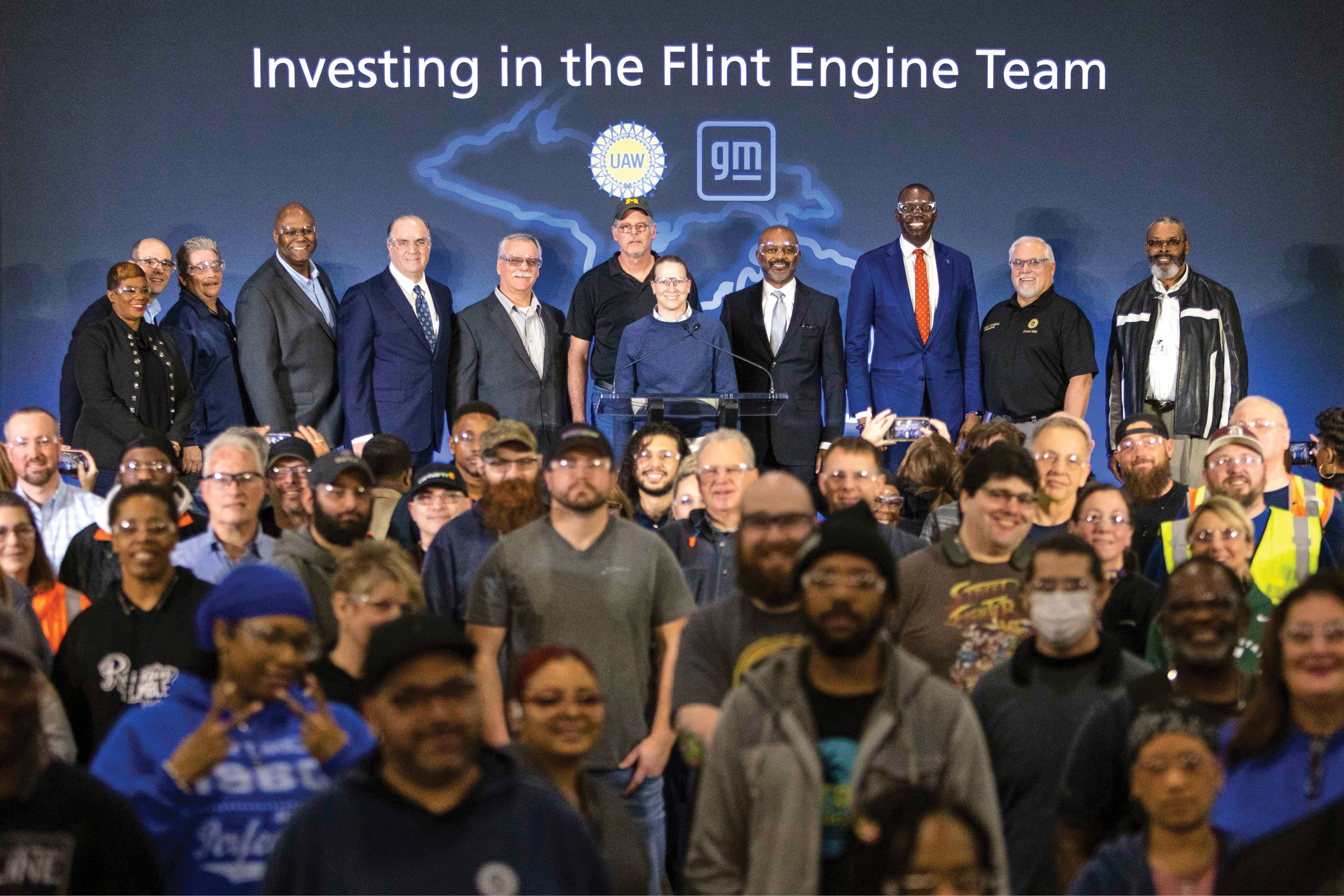
GM leaders and facility employees gathered at the company’s Flint Engine Operations plant in January to celebrate a $918 million investment in four U.S. manufacturing facilities to prepare for the production of the sixth-generation Small Block V-8.
Photo courtesy of GM
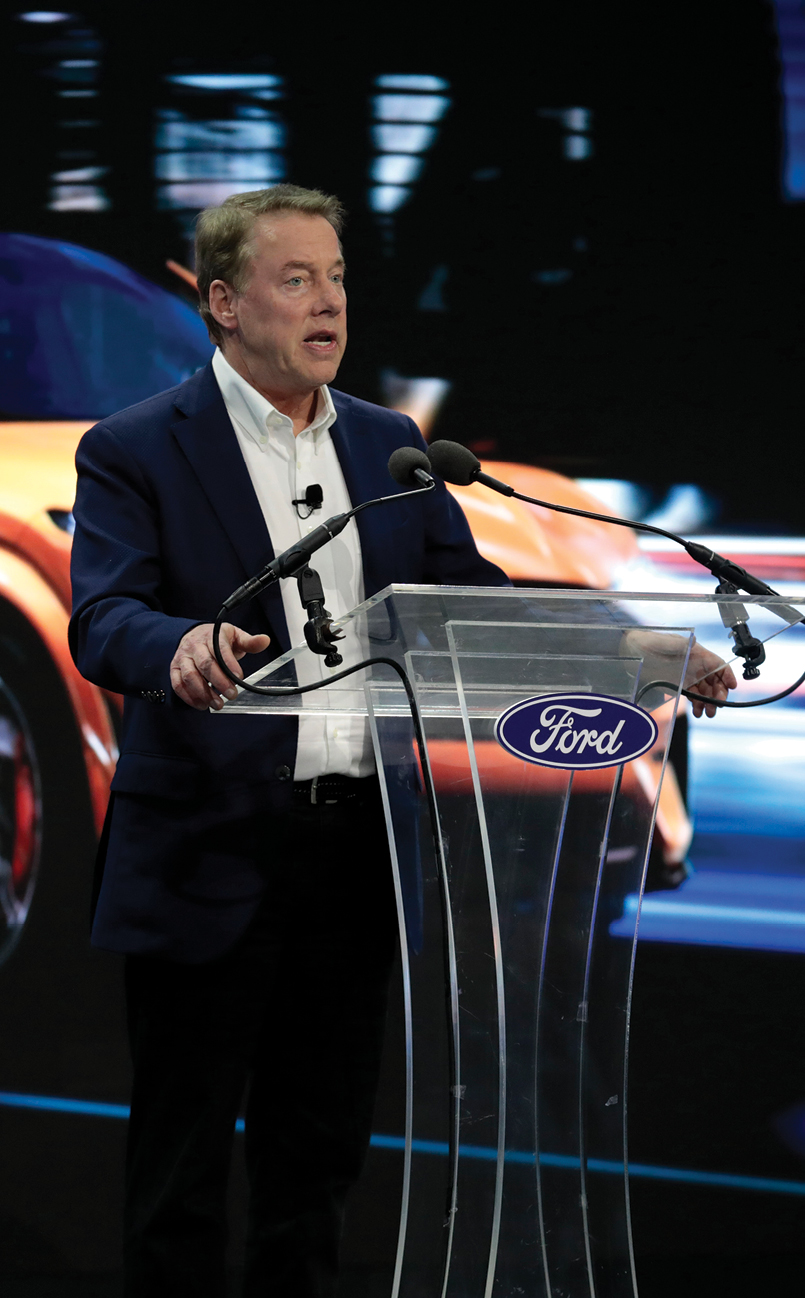
Ford Motor Company Executive Chairman Bill Ford announces a $3.5 billion investment plan for a lithium iron phosphate (LFP) battery plant in Marshall, Michigan, during an event held at Ford Ion Park in Romulus in February 2023.
Photo courtesy of Ford Motor Co.
Supercharged with Talent
Even with its talent advantages, Michigan is committed to keeping the pipeline flowing. In March 2023, Lt. Gov. Garlin Gilchrist announced the Michigander EV Scholars program, part of a $34 million talent attraction and retention strategy the MEDC says is the nation’s largest-ever campaign of its kind. The University of Michigan (U-M) — home to the Michigan Electric Vehicle Center that is supported by $130 million from the state — is a major partner, along with Michigan State University and Michigan Technological University.
The one-year pilot project is led by MEDC’s Talent Action Team, a public-private partnership of major Michigan employers, academic institutions and Michigan Works! agencies across the state. Scholarships of up to $10,000 will be awarded to as many as 350 tech students at the three participating universities if they accept a position with one of the approved companies and agree to stay on the job for 12 months in Michigan. The new hires would help fill annual demand for 500-600 electrical engineers and software developers among the participating employers, which include Bosch, DENSO, Ford Motor Co., LG Energy Solution, Mahle, Our Next Energy, Shape Corp. and ZF. Mcity, the U-M-led public-private transportation mobility research partnership, is managing the EV Scholars program for the university.
In 2022, MEDC convened the Electric Vehicle and Mobility Talent Action Team to scale talent training for the EV and mobility sector as well as foster collaborations among private industry partners, universities and the state. Only a few months later a second group was created, the Semiconductor Talent Action Team, which focuses on providing attentive support for businesses looking to expand in Michigan.
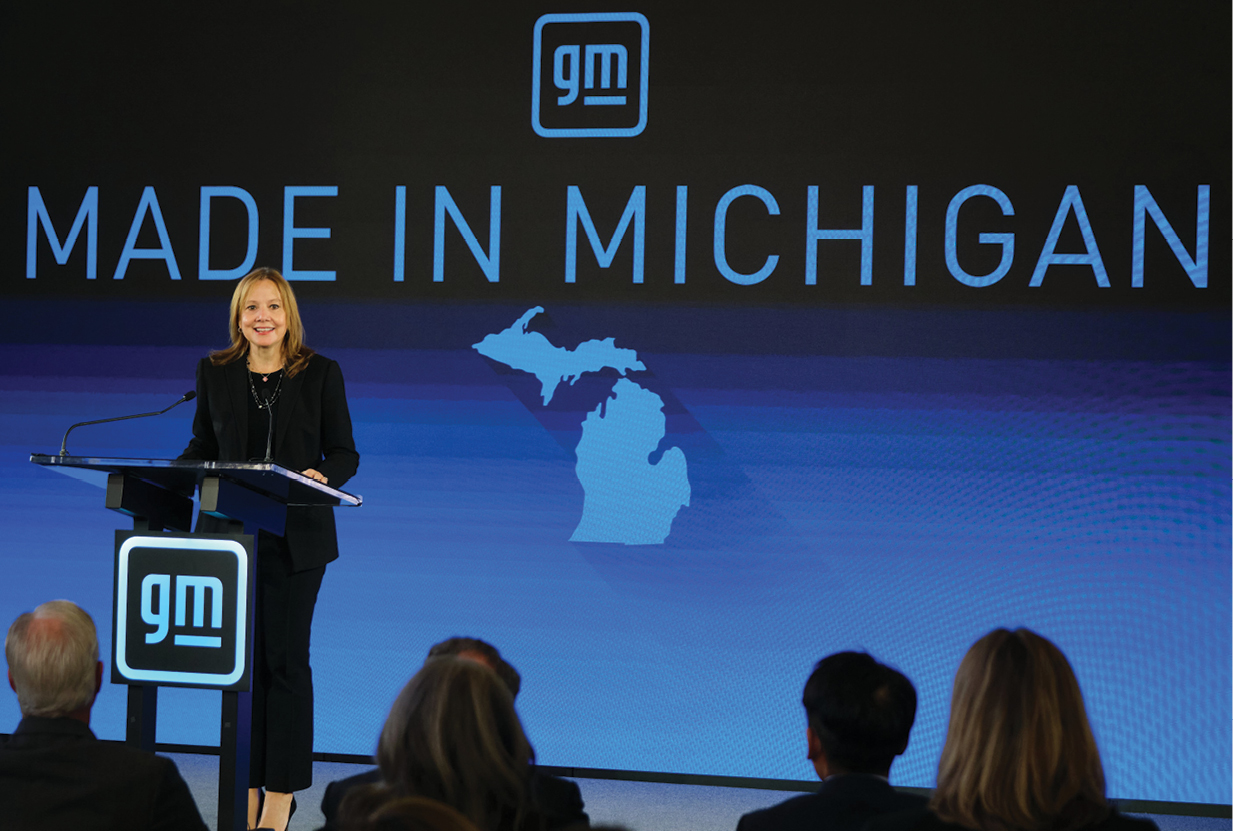
General Motors Chair and CEO Mary Barra announced on Tuesday, January 25, 2022, a GM investment of more than $7 billion in four Michigan manufacturing sites that includes building a new Ultium Cells battery cell plant in Lansing.
Photo courtesy of GM
“Michigan is committed to leading the future of the global semiconductor industry by investing in our workforce,” said Gov. Whitmer. “The demand for domestic production of semiconductors will only grow, and Michigan is in a strong position to take full advantage of this generational opportunity. I will work with anyone to bring home supply chains, create jobs and compete to win on a global scale.”
In December 2022, Gov. Whitmer joined representatives from the Detroit Regional Chamber, Michigan Department of Labor and Economic Opportunity and Michigan Office of Future Mobility and Electrification to award a $2 million grant to the Detroit Regional Chamber Foundation and MICHauto to support projects to grow Michigan’s high-tech workforce and build talent pipelines for Michigan’s automotive, mobility and technology sectors.
As Lt. Gov. Gilchrist said at the Michigander EV Scholars program launch, “we’re ready to build on our proud legacy and automotive heritage here in Michigan while ushering in a greener, more sustainable and electrified future.”
